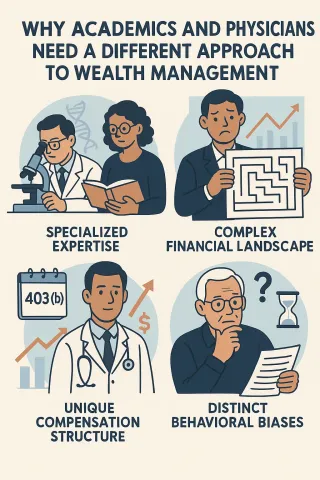Why Academics and Physicians Need a Different Approach to Wealth Management
Let's be brutally honest: your brilliance in dissecting cellular pathways or deconstructing 16th-century texts doesn't automatically translate to financial acumen. In fact, it might be working against you.
As an academic or physician, you've spent decades developing a highly specialized expertise. You've been trained to trust peer-reviewed evidence, methodical analysis, and established protocols. You value intellectual rigor and precision. You can spot a p-hacking charlatan or methodological flaw from a mile away.
Then you enter the financial world, where marketing often masquerades as mathematics, where correlation is casually presented as causation, and where complexity frequently conceals rather than clarifies. Where your departmental retirement representative seems more interested in your signature than your circumstances.
It's like suddenly being dropped into a foreign country where you speak neither the language nor understand the customs. Except in this case, the natives are actively trying to sell you something while you're trying to squeeze financial planning between grant deadlines or patient rounds.
Here's why academics and physicians need a different approach:
Your earning timeline is compressed. While your college roommates entered the workforce at 22, you spent those years accumulating degrees, fellowships, post-docs, and credentials (and often, debt). Your peak earning years started a decade later but need to accomplish more. Your MD/PhD may have cost you $2.5 million in lifetime earnings.
Your income trajectory is unusual. Unlike the gradual climb most professionals experience, yours likely features a dramatic jump from $60,000 as a resident or adjunct to $300,000+ as an attending or tenured professor. This creates unique tax planning challenges and opportunities that standard financial advice doesn't address. The 403(b)/457 combination alone requires specialized knowledge that most advisors lack.
Your workplace benefits are esoteric. From tenure considerations to academic pensions, from private practice buy-ins to hospital system benefits, from sabbaticals to research leaves, your compensation structure requires specialized knowledge to optimize. Did you know many university retirement plans offer a self-directed brokerage window? Most don't, and neither do most advisors.
Your behavioral biases are distinct. The very cognitive tools that make you successful in medicine or academia—systematic analysis, respect for precedent, thorough documentation—can become impediments in financial decision-making. The radiologist who can't pull the trigger on an investment decision because they're still gathering more data. The historian who over-researches every financial move to the point of paralysis.
The wealth management approach that serves academics and physicians best isn't about finding the most sophisticated investment strategy (despite what your ego might suggest). It's about creating a system that harnesses your analytical strengths while compensating for the blind spots your professional training inadvertently creates.
The right financial approach for you recognizes that your greatest asset isn't your portfolio—it's your human capital, your earning ability. Protecting and optimizing that asset demands a strategy as specialized as your research focus or clinical expertise.
What I'm Hearing from Clients This Week: "I've been saving in my hospital's 403(b) for 15 years and just discovered I've been paying 1.2% in hidden fees the entire time—that's $93,000 I'll never get back."
Looking for a financial advisor who understands the unique challenges of academic medicine? Forwarding this newsletter to a colleague who's considering a career shift from clinical to administrative medicine? Either way, I'd love to connect and discuss how specialized financial planning can support your professional trajectory.


